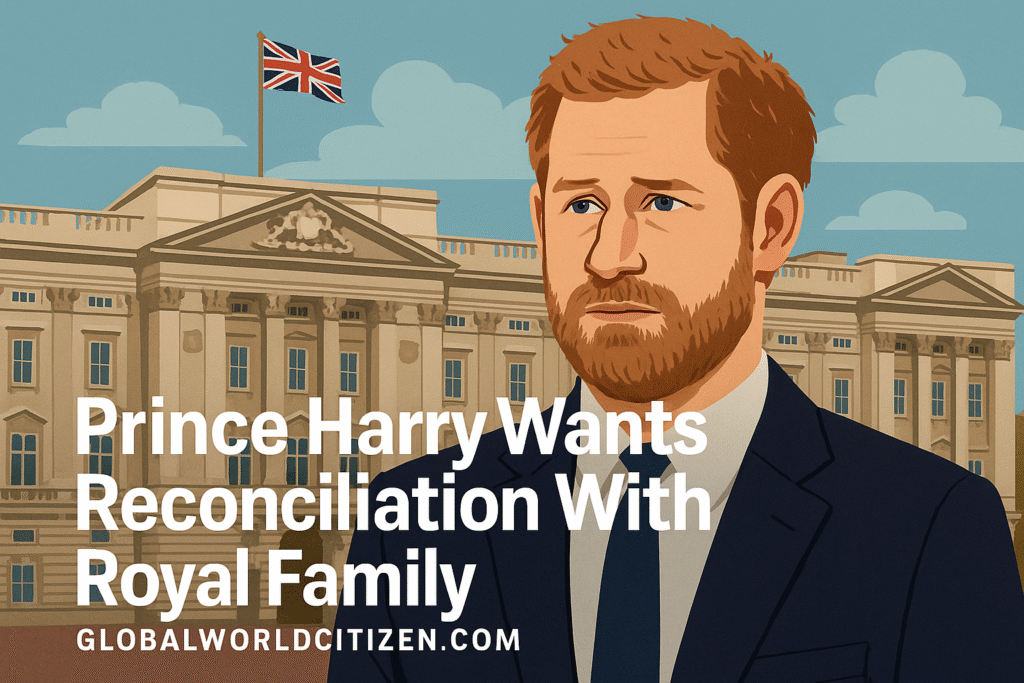Published on: May 2, 2025 By: Global Royal Affairs Desk 🌐 GlobalWorldCitizen.com
Prince Harry, Duke of Sussex, has extended a powerful call for reconciliation with the British Royal Family, following the UK High Court’s decision to deny his appeal for state-funded security protection while visiting the United Kingdom.
In a heartfelt public interview, Harry opened up about family wounds, forgiveness, and the urgency of unity—particularly amid growing public concern over King Charles III’s health.
 UK Court Dismisses Prince Harry’s Security Appeal
UK Court Dismisses Prince Harry’s Security Appeal
On Friday, the UK’s High Court ruled against Prince Harry’s attempt to reinstate full police protection, concluding that the decision to downgrade his security in 2020 was lawful and proportionate following his departure from senior royal duties.
“They made a sensible decision,” the court said, affirming the government’s position that non-working royals are not entitled to taxpayer-funded security by default.
Harry, now residing in California, alleged behind-the-scenes influence from the royal household, stating that his efforts to maintain communication with King Charles III have been damaged by the ongoing legal conflict:
“He won’t speak to me because of this security stuff.”
 “Life Is Precious”: Prince Harry’s Message of Forgiveness
“Life Is Precious”: Prince Harry’s Message of Forgiveness
Despite the legal setback, Prince Harry expressed a desire to move forward, issuing what many are calling a public olive branch:
“There’s no point continuing to fight anymore. Life is precious.”
“I’ve forgiven them… and I would love reconciliation with my family.”
As King Charles III battles cancer—diagnosed in early 2024—Harry emphasized that rebuilding trust and family unity now feels more important than ever.
 Why Prince Harry’s Return to the UK Remains Difficult
Why Prince Harry’s Return to the UK Remains Difficult
After stepping down as a senior royal in 2020, Harry lost automatic access to Metropolitan Police protection while in the UK. His current travel conditions include:
Case-by-case security reviews
Advance notice for UK visits
No access to royal intelligence briefings or secure compounds
This complexity, Harry noted, makes returning with Meghan Markle or their children extremely unlikely:
“I can’t see a world in which I would bring my wife and children back to the UK at this point.”
 Who Qualifies for Royal Security Protection?
Who Qualifies for Royal Security Protection?
The UK government provides full security only to senior working royals—such as King Charles, Queen Camilla, and the Prince and Princess of Wales.
Others, including Harry and Meghan, are left to privately fund their security, with limited state support during official visits.
 GlobalWorldCitizen.com Insight: The Future of the Modern Monarchy
GlobalWorldCitizen.com Insight: The Future of the Modern Monarchy
Prince Harry’s legal and emotional journey has become symbolic of wider questions facing 21st-century monarchies:
How do royal institutions evolve while respecting tradition?
Should taxpayer money fund protection for non-working royals?
What role do privacy, security, and global reputation play in royal diplomacy today?
This story is not just about royal drama—it highlights a deepening divide between personal identity and public duty, with global resonance for discussions on power, legacy, and personal freedom.
 Public Reaction: Critics and Allies Clash
Public Reaction: Critics and Allies Clash
While media critics like Piers Morgan have reignited calls to strip the Sussexes of their titles, others have welcomed Harry’s shift in tone—especially in light of King Charles’ declining health.
Some commentators view this as a moment of clarity, where personal forgiveness and institutional change may finally align.
 Background Recap
Background Recap
Harry’s legal action began after the UK government removed his right to automatic police protection.
His appeal cited ongoing threats and concerns for his family’s safety.
The court acknowledged these concerns, but ruled that they do not legally override the terms of his royal withdrawal.
 Final Word from GlobalWorldCitizen.com
Final Word from GlobalWorldCitizen.com
Prince Harry’s story reminds us that global visibility comes with unique risks—and that even royalty must navigate the complex intersection of security, sovereignty, and family identity.
As the world watches this latest royal chapter unfold, it’s clear that monarchies, like families, must adapt to remain relevant, respected, and resilient.

